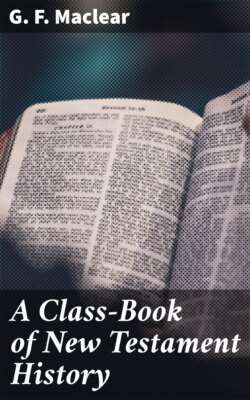Читать книгу A Class-Book of New Testament History - G. F. Maclear - Страница 28
На сайте Литреса книга снята с продажи.
Note.
The Expectation of the Messiah.
ОглавлениеFrom the earliest period of their national history the Jews had been pre-eminently “the people of the future,” and at the period we have now reached they were filled with the expectation that an extraordinary Being would appear, and prove Himself the Messiah or Deliverer. But though in the Temple of Prophecy183 there had from the beginning ever been heard two Voices mysteriously blended, one jubilant and glad, telling of victory and of triumph, the other subdued and mournful, whispering of shame and suffering, yet to one of these Voices only had attention been really paid.
The characteristics attributed by the nation to the Messiah were (i)regal, and (ii)prophetic.
i. Many looked for a great Conqueror, whom God would send, investing Him with the attributes of majesty and humanity, describing Him as the “Elect One,” the “Anointed,” the “Son of Man,” who should “execute a terrible vengeance on the enemies of His people,” “cleanse Jerusalem,” and exalt the Jews above all other nations184. These attributes, ascribed to the Messiah in early Jewish literature, receive illustration from the Gospel Narrative. It was the opinion of the national teachers that His coming would be heralded by Elias, and the belief was shared by the common people (Mtt. xvii.10 and the parallels; Comp. also xvi.14).
There was considerable uncertainty, indeed, as to the precise manner of His appearance (Jn. vii.27), but it was fully expected that He would be born at Bethlehem, the city of David (Mtt. ii.5; Comp. Jn. vii. 41,42); that He would be David’s Son, and should sit on David’s throne (Mtt. xxii.42; xii.23; ix.27; xx.30; xv.22); that He would abide for ever and set up a kingdom in which He would dispense honours on His right hand and on His left (Mtt. xx.21; Mk. x.37).
ii. With these regal attributes others combined prophetic functions, and looked for the Prophet that should come into the world (Comp. Jn. vi.14; i. 21,46; vii.40; 1 Macc. xiv.41), expecting that He would show “signs” not unlike the giving of the manna in the wilderness, and instruct the people in all things (Jn. iv.25), and instead of altering or abolishing any of the Mosaic ordinances, would enhance them to a greater glory, making the sacrifices, purifications, Sabbaths, festivals, and all other usages, far more resplendent and glorious than they had ever been before. That the Messiah would ever suffer or die was an idea, from which, to the last, even the Apostles shrank with horror and amazement (Mtt. xvi. 22,23; Lk. xxiv.21; Jn. xx.9).
